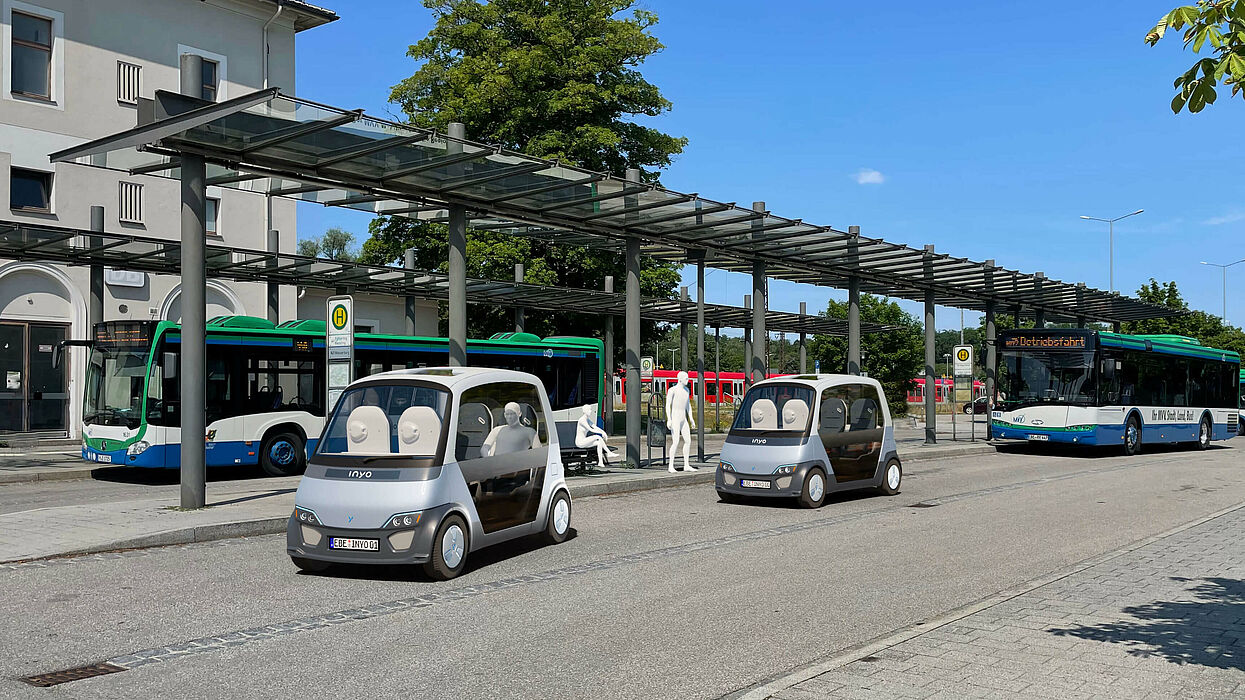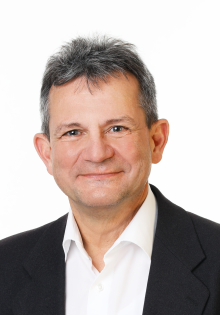Climate-friendly, sustainable and user-orientated: The "New Mobility Paderborn (Neue Mobilität Paderborn)" initiative, in which more than 70 network partners have joined forces under the leadership of Paderborn University, is committed to linking the transport and energy transition as an application centre. It is revolutionising the transport of people and goods through innovative vehicle concepts and sustainable energy generation. The principle: several vehicles, so-called autonomous cabs, join together to form a convoy and enable a practical urban-rural connection for work, living and leisure. The journeys are made individually as required and without interruptions or changes of vehicle.
"Cabs on Demand"
The initiative has been supported by the Westphalia Foundation for several years and is involved in the "NeMo.bil" project, which is funded by the Federal Ministry for Economic Affairs and Climate Protection (BMWK) with around 17 million euros and managed by INYO Mobility GmbH. The aim is to develop an innovative concept for public transport based on swarm intelligence. Data-based solutions and autonomous driving will be combined with a new vehicle system. "The latter consists of autonomous ultra-light vehicles, the 'NeMo.Cabs', which collect individual passengers and dock onto train vehicles, the so-called 'NeMo.Pros', on certain routes. Shortly before reaching their destination, they decouple and then travel the last few metres on their own again," explains project initiator Prof. Dr Thomas Tröster, Head of the "Lightweight Automotive Design" department at Paderborn University. The train vehicle also serves as an energy distributor based on hydrogen technologies, "as a kind of mobile charging station".
Hydrogen technologies and mobility hub for energy supply
The development requires various scientific and technical sub-solutions, including scalable lightweight support structures, drive and energy storage systems as well as components for convoy operation. "Particular attention is being paid to the energy supply of the NeMo.Cabs by the NeMo.Pro during the journey, for which we are developing energy storage systems with high energy density and a mobile bidirectional charging system with partners in the consortium," says Prof Dr Henning Meschede, who conducts research in the "Sustainable Materials, Processes and Products" profile area at Paderborn University. But the pros also need to be supplied with energy. The consortium is therefore planning hubs as mobility-energy interfaces at central hubs. From there, the towing vehicles will be supplied with hydrogen, among other things. Tröster explains: "The holistic view of a mobility system that is to be operated with sustainable energy requires integrated concepts that also directly consider energy supply systems."
Digital platform for data exchange and communication
And how do users and vehicles come together? A digital platform connects users, cabs and operators and combines numerous data such as charging status, weather information and journey times. Bookings can be made via an app. "The development focus is on linking real-time traffic and mobility data, ensuring connectivity to existing data spaces and developing services for planning, operating and using the new mobility offer," says Dr Christoph Weskamp, who is involved in the project via the "SICP - Software Innovation Campus Paderborn" at Paderborn University. As part of NeMo.bil, the SICP is developing optimisation models and processes for planning the swarm-like mobility system and making them available as services on the digital platform.
"A role model for mobility in Germany"
In Paderborn, more electricity is generated from renewable sources than is consumed. This makes it an ideal model region. "There is also intensive cooperation between local authorities, companies and universities, which has led to the founding of the Neue Mobilität Paderborn e.V. association, among other things. Paderborn is thus becoming a role model for mobility in Germany," says Tröster.
In addition to Paderborn University and the New Mobility Paderborn Association, NeMo.bil is supported by Aspens GmbH, AVANCO Composites GmbH, Bulight GmbH, CADFEM Germany GmbH, CP Tech GmbH, the German Aerospace Centre e.V., dSPACE GmbH, the FIWARE Foundation e.V., HOLON GmbH, INYO Mobility GmbH, LIA GmbH, PHOENIX CONTACT E-Mobility GmbH, Poppe + Potthoff GmbH, Reisewitz GmbH & Co. KG, Augsburg University of Applied Sciences and Arts, OWL University of Applied Sciences, Dortmund University of Technology and the Social Science Research Centre Berlin gGmbH.
This text has been translated automatically.


